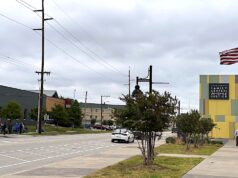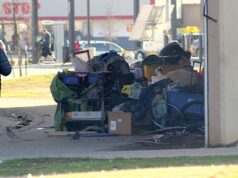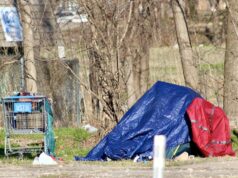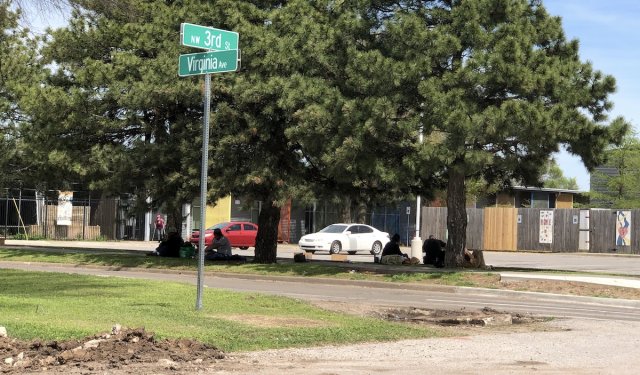

Government officials and public health experts have asked people to “stay at home” to protect themselves and help slow the spread of COVID-19. But for those who don’t have homes, taking precautions against the virus is a more complicated matter.
People experiencing homelessness and the organizations that serve them are facing a special set of vulnerabilities and challenges in the midst of the coronavirus outbreak, as many public-health directives are difficult to implement for people without stable housing. The disruptions to daily life affect the ability to meet even basic needs.
Group gatherings? For the homeless, ‘that’s their life’
On any given night, approximately 400 people in Oklahoma City are stuck outside without any form of housing, according to Dan Straughan, executive director of the Homeless Alliance. If you count people staying in shelters and various forms of transitional housing, the number balloons to more than 1,000.
Providing services to those experiencing homelessness often involves bringing people together at places such as shelters and soup kitchens, but the spread of COVID-19 has limited the ability of nonprofits to operate as usual.
“Interacting in large congregate environments — that’s their life,” Straughan said of the homeless. “Queuing for a meal or shoes or to get medications from the county pharmacy, that’s what they know. So reminding folks about social distancing can be really tough. Or just the most basic (guidelines) — wash your hands in soap and water for 20 seconds every chance you get — well, for people who are unsheltered, and even for people who are in the shelters, that can be sort of challenging.”
Overnight shelters are taking what measures they can, such as putting up barriers between beds and having people sleep with their heads on alternating sides, so that their faces aren’t near one another. But it’s difficult to practice social distancing at such close quarters.
Most of OKC’s seven shelters have stopped taking in new people or have reduced their intakes, according to Jarod Shadid of the city’s Homeless Services Department. As a result, more people are left sleeping outside than normal.
In accordance with CDC recommendations, Oklahoma City has stopped clearing temporary encampments on public property in order to reduce people’s movement and limit demand for shelter space. (Owners of private property may still ask to have encampments moved, Shadid said.)
For daytime services, organizations have transitioned from serving meals indoors to providing grab-and-go food, though this solution can also create crowding.
The Homeless Alliance, which facilitates collaboration between the city’s various homeless-services organizations, has “roughly quintupled” its street-outreach efforts, Straughan said. Teams of workers travel the city to distribute food, hygiene items and information.
Disseminating accurate information about COVID-19 and convincing people to take precautions can be difficult enough in the general population. Within the homeless population, Straughan identified additional barriers, such as “educational attainment (…) mental illness or substance abuse.” There is also, he added, “a certain amount of fatalism.”
“People think, ‘Well, it’s not like I have a home where I can shelter in place, so what the heck,’” Straughan said.
Lt. Don Holland, a member of the OKCPD Homeless Outreach Team, said he has encountered many people who are nervous about the outbreak and are avoiding shelters. Some believe it is safer to stay outside, he said.
“I think a lot of the homeless are concerned,” Holland said. “They read the papers. They hear the news. They get a lot of their information though scuttlebutt in different homeless camps.”
COVID-19 often not the most pressing concern
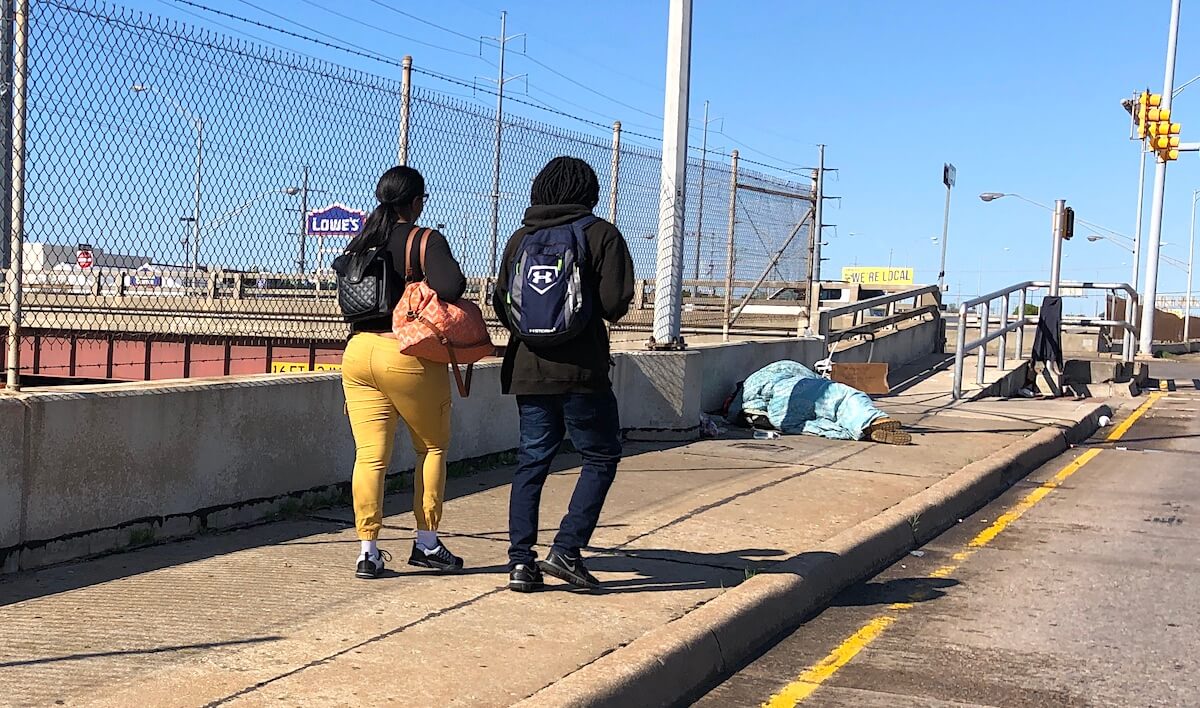
On a recent cloudy afternoon in Oklahoma City, a group of people living in a small temporary encampment on an empty lot came out to meet workers from the Homeless Alliance who were distributing food, masks and other supplies.
“We’re hearing a lot of rumors,” said one resident, of COVID-19.
According to one rumor, the whole thing is a hoax. According to another, the virus is going to mutate and become even more deadly. Either way, members of the camp were not particularly focused on the virus itself.
“We’re so exposed to the elements anyway,” said Caren Thompson, another camp resident.
A more pressing concern is the loss of resources. It’s been harder to get meals, medications and other necessities. With shelter facilities closed, many lack a place to shower or use the restroom.
“It’s caused more people to steal and try to break in places,” Thompson said. “You’re seeing people do things they wouldn’t normally do.”
Another resident said someone from outside the camp had tried to break into one of their tents just the night before.
“Everything is just rough right now,” Thompson said. “People are feeling desperate.”
Camp residents were also feeling the effects of the broader COVID-19 shutdowns. Thompson said she had a job lined up just before the virus started to spread, but it was in food service and fell through as shutdowns hit the restaurant industry.
“People don’t have access to the services that would allow them to try to change their situation,” said Erin Goodin, president of the City Rescue Mission.
Many offices are shuttered, and the closure of libraries and other public spaces cuts off internet access. As a result, it’s become more difficult to apply for jobs, look for apartments or obtain identification papers. Services that have been expanded for remote access, such as tele-health, are not much good for someone without a phone or a place to charge one.
‘I think you could see a whole other crisis’

Homeless service organizations throughout Oklahoma City were quick to respond to the outbreak in its early days. City Rescue Mission and Grace Rescue Mission dedicated space to create two special facilities: one for elderly and immunocompromised people and the other for people who might have symptoms of infection.
But the plan ran into a roadblock when it came to staffing.
“The problem is, we were going to staff that with [the Oklahoma] Medical Reserve Corps, but they haven’t even themselves been able to rally enough volunteers to staff it,” Shadid sad. “So the facilities are there. They’re all set up. We just don’t have people to run them.”
Shadid said there have also been offers from hotels (“if we can afford to pay for them”) and from Southern Nazarene University to provide space.
“We have facilities coming out our ears,” he said. “But we don’t have the staffing or the other funding resources to run them right now.”
Shadid said he’s worried about the long-term fallout from COVID-19 as unemployment numbers hit record highs.
“Private (donation) money is going to take a huge dip in the coming months, I’d imagine,” he said. “And that’s a problem because services are going to increase dramatically.”
As the economic consequences of the outbreak unfold, Shadid anticipates seeing a surge of people needing assistance of one sort or another, whether it’s housing or food or help with bills, even after the virus has passed.
“I’m almost more worried about that, after this is over with, than I am during the crisis,” he said. “I think you could see a whole other crisis.”
For safety reasons, organizations are not currently putting out calls for volunteers, and they don’t have enough people to sort through large quantities of donations. Shadid said the most helpful thing people can do right now is to provide financial assistance and moral support.
“People don’t think of homeless service providers when they talk about people on the front line,” Shadid said. “They’re also out there in big, crowded environments trying to help people every day. So I just hope people will keep them on their list when they’re thanking people.”









